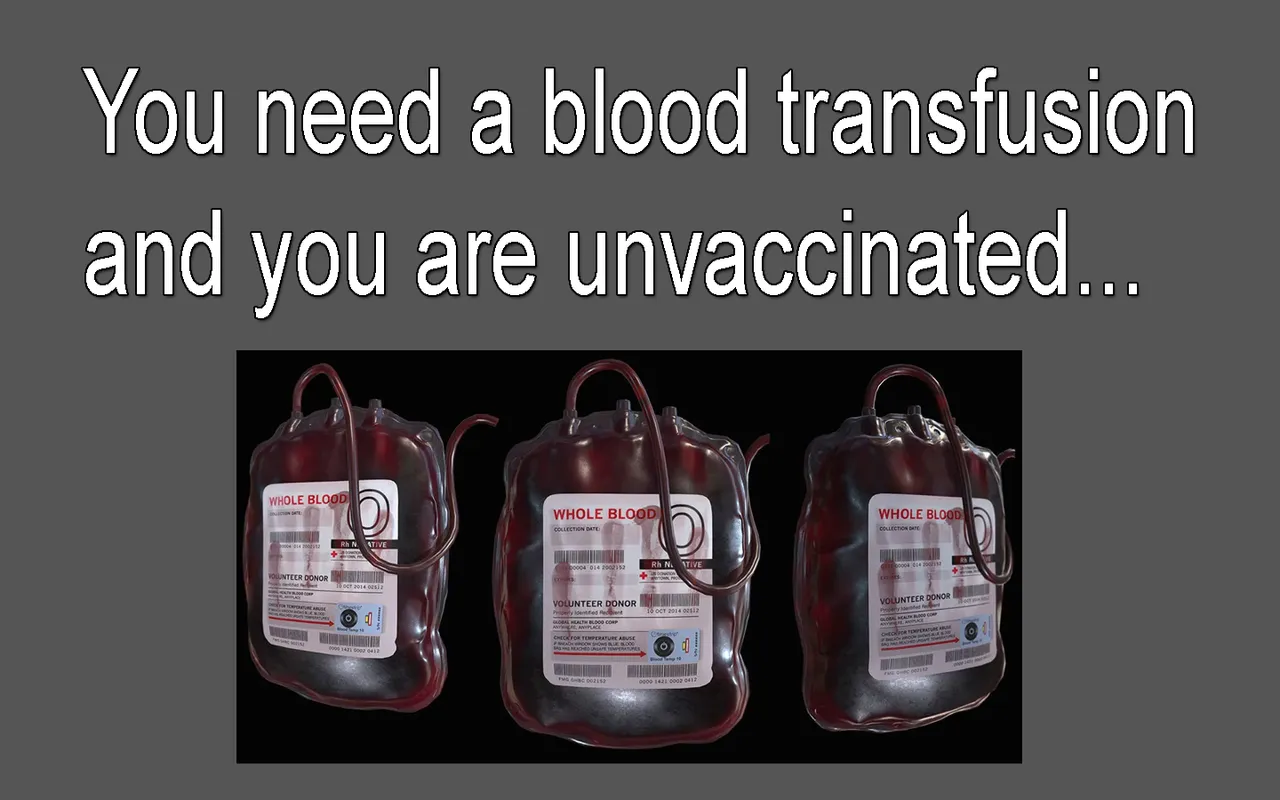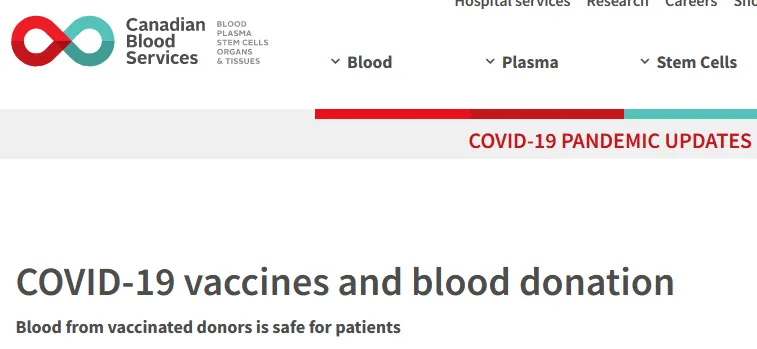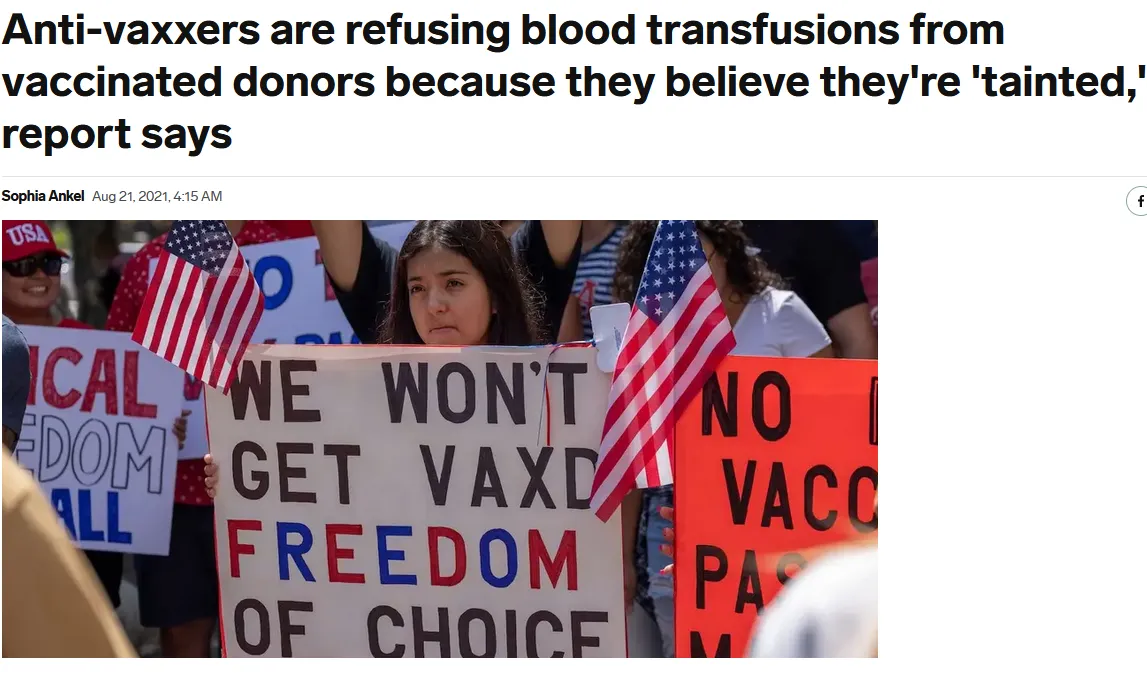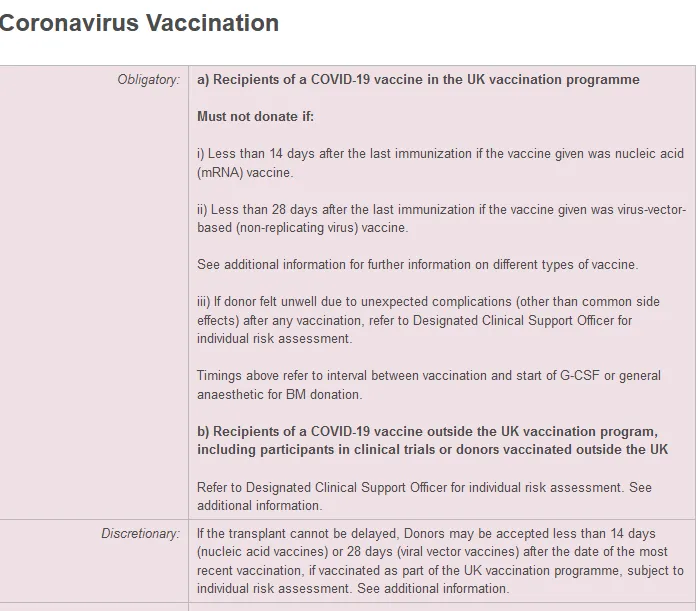Something has entered my mind numerous times over the past year but, I think I thought "That's a scary thought" and then my mind immediately shifted to something else rather than thinking about it.

When I get blood can I be certain I am getting blood from someone that is unvaccinated like myself? If not then there is a pretty good chance I may end up vaccinated against my will simply because the blood may carry it.
I haven't researched it a lot so I am suspecting that the blood itself will not kick in the mRNA type action. I likely would be safe from that. I may get a bunch of spike proteins produced by mRNA triggered cells in the donor but there is a good chance it would not actually impact me.
The thing that is a bit scary is I don't actually know what would happen.
I decided to write this post and do a little research. I just found the following article on webmd.com.

COVID Skeptics Request Blood Transfusions From Unvaccinated Donors
The nation’s roiling tensions over vaccination against covid-19 have spilled into an unexpected arena: lifesaving blood transfusions.
Yes, that is the concern that has me writing this document.
With nearly 60% of the eligible U.S. population fully vaccinated, most of the nation’s blood supply is now coming from donors who have been inoculated, experts said. That’s led some patients who are skeptical of the shots to demand transfusions only from the unvaccinated, an option blood centers insist is neither medically sound nor operationally feasible.
Then there is the following paragraph:
Emily Osment, an American Red Cross spokesperson, said her organization has fielded questions from clients worried that vaccinated blood would be “tainted,” capable of transmitting components from the covid vaccines. Red Cross officials said they’ve had to reassure clients that a covid vaccine, which is injected into muscle or the layer of skin below, doesn’t circulate in the blood.
If you've been following this then you know this is not absolutely true. I am suspecting if you received a transfusion of blood from someone that was very recently vaccinated there could be a risk. If it was blood that was donated awhile after the transfusion then you may get the spike proteins but you'd likely not get the actual gene therapy from the mRNA. I personally am only concerned about that and not particularly concerned about the spike proteins. I do know the spike proteins cause the bulk of the negative symptoms of COVID but I've had it twice now I suspect. Once with the original version where I wasn't tested but it fit, and once where everyone in my family caught it and my father in-law actually died from it. That one I suspect was Omicron variant assuming the variant narratives have any merit.
The truth of the matter...
If you are in need of blood to survive then you are likely not in a situation where it is safer to refuse the transfusion. In that case the risk of not getting the transfusion out weighs the risks of not getting it.
I'll go ahead and give you some more links:
At this point I have very little trust in the FDA as I've watched them push lies repeatedly. The following none the less is an article from that source:

Updated Information for Blood Establishments Regarding the COVID-19 Pandemic and Blood Donation
FDA continues to work closely with CDC and other federal and international agencies to monitor the coronavirus disease 2019 (COVID-19) pandemic caused by the virus, SARS-CoV-2. Respiratory viruses, in general, are not known to be transmitted by blood transfusion. There have been no reported cases of transfusion-transmitted coronavirus, including SARS-CoV-2, worldwide.
Routine measures used to determine blood donor eligibility prevent individuals with clinical respiratory infections from donating blood. For example, blood donors must be in good health and have a normal temperature on the day of donation (21 CFR 630.10).

Refusing blood transfusions from COVID-19-vaccinated donors: are we repeating history?
Blood transfusion is among the most frequently performed medical procedures in the USA,1 yet the history of this life-saving practice is mired in controversy, beginning with the barring of African-Americans from donating blood.2-4 Following criticism of this policy, the American Red Cross (ARC) instead began segregating and labelling blood such that the product could be easily identifiable as being from an African-American blood donor.2-5 The ARC anticipated that recipients would refuse blood transfusions from African-American donors, as their blood was deemed infectious and the medium through which diseases such as sickle cell anaemia were transmitted, despite a consensus that this disease is genetic.5, 6 Even after the official de-segregation of the nation’s blood supply, several states passed legislation requiring hospitals and physicians to inform blood transfusion recipients of the blood donor’s race.3, 7

COVID-19 vaccines and blood donation
Blood from vaccinated donors is safe for patients
Our ultimate priority is the health of the patient and donor. As part of our mandate to provide a safe, accessible blood supply to Canadians, medical and scientific professionals at Canadian Blood Services carefully review and assess each vaccine authorized for use in Canada. Health Canada has not recommended or imposed any restriction on the use of the four authorized COVID-19 vaccines and blood donation.
With COVID-19 vaccines, the mRNA or viral-vector vaccine is broken down quickly once it enters the body’s cells and there is no evidence that transfused blood collected from donors who were previously vaccinated with COVID-19 vaccine poses any harm to patients. Further, blood donated by individuals who have received a COVID-19 vaccine is not associated with a risk to a transfusion recipient of COVID-19 infection, nor will it protect a transfusion recipient from COVID-19 infection.
Must not donate if:
i) Less than 14 days after the last immunization if the vaccine given was nucleic acid (mRNA) vaccine
ii) Less than 28 days after the last immunization if the vaccine given was virus-vector-based (non-replicating virus) vaccine.
See additional information for further information on different types of vaccine.
iii) If donor felt unwell due to unexpected complications (other than common side effects) after any vaccination, refer to Designated Clinical Support Officer for individual risk assessment.
Timings above refer to interval between vaccination and start of G-CSF or general anaesthetic for BM donation.
b) Recipients of a COVID-19 vaccine outside the UK vaccination program, including participants in clinical trials or donors vaccinated outside the UK
Refer to Designated Clinical Support Officer for individual risk assessment. See additional information.

